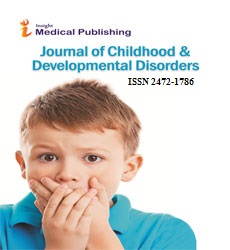Tourette Syndrome: Types And Symptoms
Orhan Derman*
Department of Pediatrics, Hacettepe University Medical School, Turkey
- *Corresponding Author:
- Orhan Derman, Department of Pediatrics, Hacettepe University Medical School, Turkey, Email: dermanorhan@hc.com
Received Date: November 01, 2021; Accepted Date: November 15, 2021; Published Date: November 22, 2021
Citation: Orhan Derman (2021) Tourette syndrome: Types and Symptoms. J Child Dev Disord.7 No.11
Introduction
Tourette Syndrome (TS) is a sensory system disorder. Individuals with TS develop "Tics." Tics are uncontrollable jerks, movements, or sound that people repeat over and over. Tic sufferers are powerless to stop their bodies from acting in this way. For example, a person's eyes may continue to flash over and over. On the other hand, a person may hesitantly make a snorting sound. Tics are similar to hiccups in that they occur in waves. Regardless of whether you want to hiccup or not, your body will do so. Individuals can occasionally keep themselves from doing a certain Tic for a period of time, although it is difficult all at once. Finally, the individual must perform the Tic.
Types of Tics
Tics are divided into two categories: motor and vocal:
Motor Tics: Motor Tics are physical manifestations. Motor Tics can be identified by flashing, shrugging shoulders, or snapping an arm.
Vocal Tics: Vocal Tics are sounds produced by an individual's voice. Murmuring, making a sound as if to talk, or shouting out a word or expression are all examples of vocal Tics. Tics can be simple or complicated:
Simple Tics: Simple Tics only affect a few sections of the body. Squinting your eyes or sniffing your nose is examples of simple Tics.
Complex Tics: Complex tics are characterised by the involvement of multiple bodily parts and the presence of a pattern. Bobbing the head while jerking one arm and then springing up is an example of a complex tic.
Symptoms
Tics are the most common TS adverse effects. The majority of side effects appear between the ages of 5 and 10. Motor Tics that occur in the head and neck region are the most common symptoms. Tics are usually worse at moments that are unpleasant or invigorating. When a person is calm or focused on a movement, they will usually grow further. Over time, the types of Tics and the frequency with which they occur alter dramatically. Despite the fact that the signs may appear, disappear, and reappearance, these conditions are considered constant.
Tics often lessen during adolescence and early adulthood, and may eliminate entirely. Regardless, many people with TS endure Tics well into adulthood, and Tics can sometimes get even worse as they become older. Despite the fact that the media frequently portrays people with TS as impulsively yelling out foul words (called coprolalia) or constantly rehashing other people's expressions (called echolalia), these signs are fascinating and are not required for a diagnosis of TS.
Diagnosis
There is no one test for TS that is comparable to a blood test. To diagnose TS and other Tic issues, health professionals look at the individual's symptoms. The Tic concerns differ in terms of the type of Tic present (Motor or verbal, or a combination of both) and the length of time the indicators have been active. If a person has both Motor and vocal Tics and has suffered Tic side effects for at least a year, TS can be investigated.
Treatment
Despite the fact that there is no cure for TS, there are medications that can help with the Tics. Many people with TS have Tics that don't interfere with their daily lives and, as a result, don't require treatment. However, if Tics cause pain or injury, slow down school, employment, or public activities, or cause pressure, prescription and behaviour treatments are available.
Open Access Journals
- Aquaculture & Veterinary Science
- Chemistry & Chemical Sciences
- Clinical Sciences
- Engineering
- General Science
- Genetics & Molecular Biology
- Health Care & Nursing
- Immunology & Microbiology
- Materials Science
- Mathematics & Physics
- Medical Sciences
- Neurology & Psychiatry
- Oncology & Cancer Science
- Pharmaceutical Sciences
